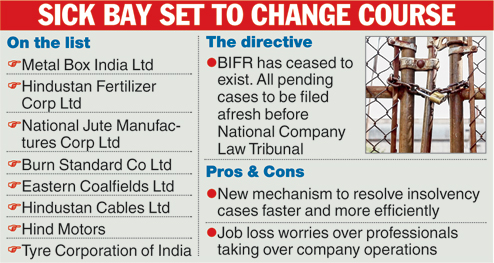
Calcutta, Jan. 6: Bengal chief minister Mamata Banerjee has questioned the Centre's move to repeal the Board For Industrial & Financial Reconstruction (BIFR), adding one more front to her all-out war against the Narendra Modi-government.
Banerjee referred to a letter written by the corporate affairs ministry to the state government earlier this week that informed it about the Union government's decision to create a new mechanism to deal with sick companies.
"We received a letter from the Centre yesterday informing that the BIFR will not exist anymore. They even dismantled the Planning Commission and set up Niti Aayog with their own men who do not understand the country. Some changes can always be brought in, but what's the point of doing away with the BIFR? This will affect workers and labourers immensely as so many sick companies are under it. All the institutions are under attack. This is a dangerous game," said Mamata.
There are scores of sick companies in Bengal that were at various stages of progress in their efforts to come out of the BIFR. Many central public sector units, registered in the state, feature on the list (see chart).
In a letter dated January 2, Tapan Ray, secretary at the corporate affairs ministry, wrote to Bengal chief secretary Basudeb Banerjee, stating that all pending cases before the BIFR and the AAIFR (Appellate Authority for Industrial & Financial Reconstruction) need to be filed afresh before the National Company Law Tribunal (NCLT).
"All pending cases before BIFR & AAIFR stand abated. Fresh cases can be filed against companies and limited liability partnerships for inability to pay debt and corporate insolvency resolution under the code before NCLT," Ray wrote.
The Centre had repealed the Sick Industrial and Companies Special Provisions Act, 1985, from December 1, 2016, and promulgated the Insolvency and Bankruptcy Code, 2016, to speed up the resolution of sick companies.
The BIFR and the AAIFR had become almost non-functional because of lack of manpower to deal with the huge number of cases that dragged on for years. As a result, valuable land assets remained locked with these companies. The Centre had even toyed with the idea of transferring idle assets locked in sick units to a separate company and deploy it as a land bank for prospective investors.
In the letter, Ray said, "It is expected that the new framework will result in greater efficiency in the resolution of insolvency of companies in terms of lesser time taken for recovery of credit, higher recovery rate and higher value capture through re-organisation of such companies as going concern."
Experts differed in their opinion on the move. "It causes a situation of turmoil for manufacturing industries covered under Schedule One of the Industrial Development and Regulation Act as all pending proceedings have been abated. The new code will lead to a threat of takeover of management and operation of companies by insolvency professional, leading to unemployment and uncertainty," Sanjay Basu, partner of law company Aquilaw, said.
Manas Kumar Thakur, president of the Institute of Cost Accountants of India, however, said, "Under BIFR, companies were appointing lawyers and delaying the resolution process. Several accounts continued to remain non-performing on the books of banks. But the code has set time-bound limits on the resolution of cases. This would mean legacy cases in Bengal and other states can now be resolved quickly".











